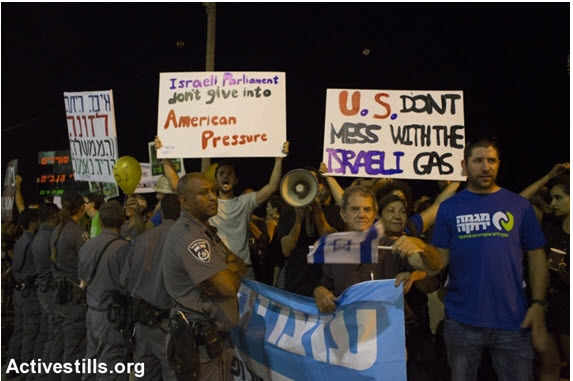Hundreds of activists protested at the US embassy in Tel Aviv on Sunday evening, July 26, against the US’s imperialist intervention in the decision to bring the proposed natural gas deal to a vote in the government. Protesters held banners, in Hebrew and English saying “The gas plan is dangerous to Israel,” “The gas plan – a disaster for us all,” and chanted: “This gas belongs to all of us” and “No to a government of tycoons.”

Hundreds demonstrated on Sunday, July 26, opposite the US Embassy in Tel Aviv to protest that country’s imperialist intervention in the natural gas plan. (Photo: Activestills)
The Cabinet is expected to deliberate Wednesday, July 29, on a proposed roadmap for the development of Israel’s natural gas fields, though it remains uncertain whether the ministers will be asked to vote on the approval of the arrangement. If it appears that the roadmap has garnered the support of a majority, it will be brought to a vote at the Cabinet meeting on Wednesday; it may even be brought to the Knesset floor the same day, before the chamber adjourns for its month-long summer recess.
Given the public statements made in recent weeks by neo-liberal Yesh Atid chairman Yair Lapid and head of the extreme-right wing party Yisrael Beytenu, Avigdor Lieberman, that they will support the government’s plan, Netanyahu’s coalition hopes to get a majority of votes in the Knesset, leaving final approval in the hands of Economy Minister Aryeh Deri. Sources in the political establishment believe that if the Knesset approves the roadmap, Deri will agree to bypass the antitrust regulator and using the Section 52 exemption of the Restrictive Trade Practices Law (5748-1988) to sign off on the arrangement himself. This clause reads:
The Minister may, following consultation with the Knesset’s Economic Affairs Committee, exempt a restrictive trade practice from all or some of the provisions of this Law, if he believes that such action is necessary for reasons of foreign policy or national security.
Related:
- Billionaire Adelson to Netanyahu: “Streamline Gas Industry Regulations”; Thousands Protest against Deal in Tel Aviv
- MK Khenin: Antitrust Commissioner’s Resignation – Victory for Gas Tycoons & Their Puppets in the Government
- Thousands Protest Gas Deal in Tel Aviv, Jerusalem, Be’er Sheva, Kiryat Shmona, and Caesarea
- US Ambassador Presses Joint List MKs on Gas Deal Vote


